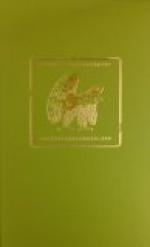He had stopped near the table, and his glance fell on the package in the ring of light from the shaded lamp. After a moment he lifted it and, drawing up a chair, seated himself and removed the wrapper. It covered a tin box such as he was accustomed to use in the wilderness for the protection and portage of field notes and maps. He raised the lid and took from the top a heavy paper, which he unfolded and spread before him. It was Weatherbee’s landscape plan, traced with the skill of a draughtsman and showing plainly the contour of the tract in eastern Washington and his method of reclamation. The land included a deep pocket set between spurs of the Cascade Mountains. The ridges and peaks above it had an altitude of from one to six thousand feet. He found the spring, marked high in a depressed shoulder, and followed the line of flume drawn from it down to a natural dry basin at the top of the pocket. A dam was set in the lower rim of this reservoir and, reaching from it, a canal was sketched in, feeding cross ditches, distributing spillways to the orchards that covered the slopes and levels below. Finally he traced the roadway up through the avenues between the trees, over the bench, to the house that commanded the valley. The mission walls, the inside court, the roomy, vine-grown portico, all the detail of foliage here had been elaborated skilfully, with the touch of an artist. The habitation stood out the central feature of the picture and, as a good etching will, assumed a certain personality.
How fond David would have been of a home,—a home and children! Tisdale folded the plan and sat holding it absently in his hands. His mind ran back from this final, elaborated copy to the first rough draft Weatherbee had shown him one night at the beginning of that interminable winter they had passed together in the Alaska solitudes. He had watched the drawing and the project grow. But afterwards, when he had taken up geological work again, they had met only at long intervals; at times he had lost all trace of Weatherbee, and he had not realized the scheme had such a hold. Still, he should have understood; he should have had at least a suspicion before that letter reached him at Nome. And even then he had been blind. With that written proof in his hands, he had failed to grasp its meaning. The tragedy! the shame of it! That he should have hesitated,—thrown away four days.
He looked off once more to the harbor, and his eyes gathered their far-sighted expression, as though they went seeking that white trail through the solitudes stretching limitless under the cold Arctic night. His face hardened. When finally the features stirred, disturbed by forces far down, he had come to that make-believe orchard of spruce twigs.




